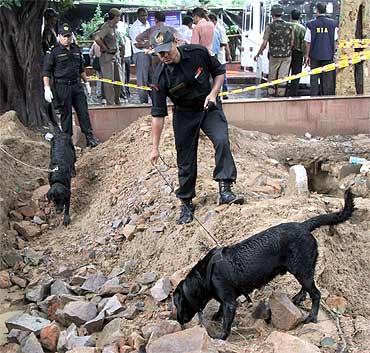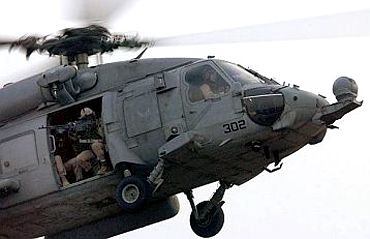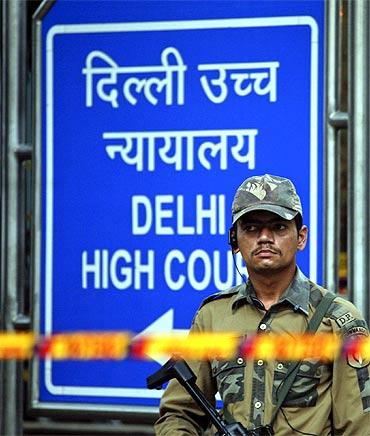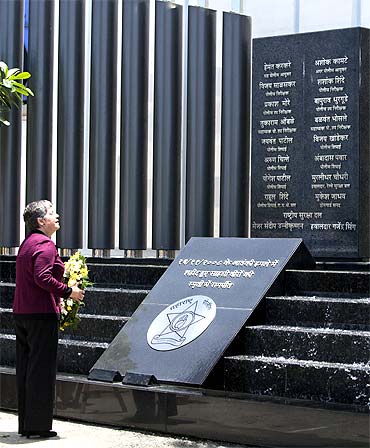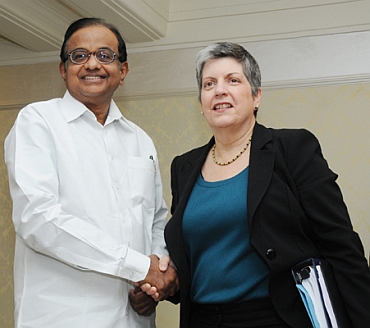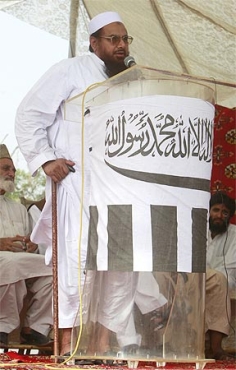 | « Back to article | Print this article |
'Delhi HC attack has Lashkar's hallmark'
The recent attack on the Delhi high court exposes lacunae in India's counterterrorism efforts, says Dr Sahibzada Amer Latif, a visiting fellow at the Center for Strategic and International Studies in the newly established Wadhwani Chair for United States-India policy studies. According to him, the terror strike has the hallmark of the dreaded Lashkar-e-Tayiba, whose ability to upset regional stability between India and Pakistan is arguably greater than other terror threats faced by the US.
The recent Delhi high court attack has the hallmark of the Lashkar-e-Tayiba, working through its surrogates in India, asserts Dr Sahibzada Amer Latif, a visiting fellow at the Center for Strategic and International Studies in the newly established Wadhwani Chair for US-India policy studies.
Testifying before the house foreign affairs subcommittee on terrorism, nonproliferation and trade, he warned that if such attacks continue and if there is another 26/11-like strike that provokes India it would complicate Washington's counter-terrorism efforts in Pakistan's Federally Administered Tribal Areas.
"As we sit here shortly after the tenth anniversary of the 9/11 attacks, India has once again endured another attack, which occurred at the Delhi high court," he said at the subcommittee hearing, titled 'US-India Counterterrorism Cooperation: Deepening the Partnership'. The hearing was convened by Congressman Ed Royce, who is also the Republican co-chair of the Congressional Caucus on India and Indian Americans.
"Current figures put the death toll of the Delhi blast at 13, which may increase with many of the remaining 73 injured in a critical condition. This attack followed the triple blasts in Mumbai on July 13 that left 26 dead and 130 injured. These attacks were the latest in a series of strikes that have hit India since 26/11," said Latif, who is on secondment from the Pentagon, where he was serving as the director of South Asian affairs.
Click NEXT to read further...
'India's retaliation to affect US counterterrorism efforts in Pak'
The LeT represents one of the greatest threats to American and Indian interests in South Asia today. After the spectacular attacks in Mumbai in 2008, the US undertook active shuttle diplomacy to dampen tensions between the nuclear-armed neighbours, he pointed out.
But Latif predicted, that if there's "another major attack on the scale of Mumbai 2008 that originates in Pakistan," it could lead to calls from the Indian public for retaliation. "If India was to retaliate or threaten to retaliate, it could also adversely affect US counterterrorism efforts in FATA."
In such an event, "Pakistan would most likely divert important assets and troops currently deployed in the FATA eastwards towards the Indian border. While the US involvement in Indo-Pak crises has often played an important role, there is no guarantee that it will have the same mitigating effect the next time around," he said.
'Delhi attack exposes lacunae in India's counterterrorism efforts'
He said, "The recent attacks in New Delhi and Mumbai revealed that India has much work ahead to build the necessary capabilities to thwart another terror attack. The recent attacks have demonstrated that India's ability to detect and deter terror appears to have only marginally improved."
"India has had success in the past against other forms of terrorism such as Khalistani terrorism in the Punjab during the 1980s. But, it now needs to adopt a fresh approach that is built around a national strategy, which combats terrorism through a multi-agency approach in close coordination with state governments," he added.
According to Latif, after the US and India have deepened their partnership over the last decade, counterterrorism cooperation has been touted as a key component of the relationship. Both sides have ritually condemned terrorism in all forms through various public forums and joint statements.
However, he said, "It is useful at this juncture to evaluate the status of bilateral counterterrorism efforts, assess progress to date, understand existing challenges, and determine where greater progress might be made."
'Indo-US homeland security dialogue a good step forward'
In July last year, the US and India signed the counterterrorism cooperation initiative, which outlined a range of areas for cooperation to include forensics training, investigative assistance, enhancing capabilities on money laundering, exchanging best practices on mass transit and rail security, and maritime security.
The inaugural US-India homeland security dialogue in New Delhi with Secretary of Homeland Security Janet Napolitano and her Indian counterpart P Chidambaram held in May this year is "a good step forward, as it will encompass the breadth of homeland security cooperation to include maritime security, infrastructure protection and intelligence sharing," Latif said.
"Intelligence sharing, while always difficult to judge, appeared to deepen after the 26/11 Mumbai attacks as the Federal Bureau of Investigation officials closely collaborated with their Indian counterparts," he added.
'Opaque nature of Indian decision-making deters closer cooperation'
But Latif argued that while bilateral counterterrorism cooperation has rhetorically become an important area of collaboration, some key challenges still remain. One of the biggest challenges is getting the American and Indian bureaucracies optimally aligned to facilitate better communication and coordination.
There are currently a number of bilateral working groups that have counterterrorism equities and are spread across various US government agencies to include homeland security, state, treasury, and defence. On the US side, many of these dialogues do not regularly communicate or coordinate with one another, and several dialogues have overlapping areas of cooperation. One suspects the same situation on the Indian side where interagency communication and coordination can be scarce.
"The limited Indian bureaucratic capacity and centralised decision-making present challenges to effective counterterrorism cooperation as well. The Indian system can be easily overwhelmed with various US government agencies attempting to engage it on various dimensions. For India, terrorism is a domestic law enforcement issue that resides with the home ministry," the official said.
He bemoaned that the Indian bureaucracy also does not have analogous agencies or offices for every area of cooperation making it common for one joint secretary or director to be responsible for multiple areas of cooperation.
"South Block's highly centralised decision-making system, in which decisions on routine activities and cooperation are frequently referred to higher levels, can cause delays and sometimes outright cancellations. The opaque nature of Indian decision-making can be a significant deterrent to closer cooperation," he added.
The relationship between the Indian central and state governments is important to note, Latif points out.
According to the Indian Constitution, the state is given primary responsibility for law enforcement matters. "To that end, the state governments are the first responders to terrorist attacks. The nature of Centre-state relations also complicates bilateral cooperation since the US government cannot directly engage state governments without first going through the central government," he said.
'Osama's killing limits pressure US can apply on Pak to dismantle LeT'
"For India, Pakistan represents the epicenter of the terror threat against India. Indian officials are frustrated that Washington does not push the army leadership in Rawalpindi more aggressively to dismantle LeT's infrastructure," he said.
"The US on the other hand, has been occupied with trying to get the Pakistan army to sustain current operations in FATA while undertaking new ones in North Waziristan. For Washington, asking Rawalpindi to also aggressively pursue the dismantling of LeT as vigorously as militants in the FATA could stretch Pakistani capacity and detract from Washington's primary aim of disrupting the Al Qaeda and the Afghan Taliban," he said.
The current state of US-Pakistan relations in the wake of the Raymond Davis case and the killing of Osama bin Laden further limits how much pressure Washington can apply to Rawalpindi to dismantle the LeT. While Washington realises the danger that LeT poses to regional stability and has been vocal about bringing the Mumbai attackers to justice, it still does not meet Indian expectations of placing it on an equal plane with the Al Qaeda and the Afghan Taliban, he pointed out.
'India's doubts about US transparency compounded after Headley case'
He explained that India's doubts about US transparency were compounded when queries to question Headley were not immediately granted. A subsequent US investigation into the David Headley affair ordered by Director of National Intelligence James Clapper ultimately revealed that while some information was available to US officials before the Mumbai attacks, it was not sufficient to link Headley to a terror plot in India.
"However, among some segments of Indian government officials and its strategic elite, there may be a lingering perception that Washington will not divulge information that could possibly compromise its relations with Pakistan," he said.
'LeT's ability to upset stability in India, Pak bigger than any US terror threat'
He said the US side should also undertake an active effort to examine all working groups and dialogues and consolidate those groups where there are overlaps or redundancies. "The Indian side should endeavour to decentralise some of its decision making, establish authoritative points of contact for all counterterrorism engagements, and facilitate more seamless approval processes for related activities."
Latif also said, "Coastal and maritime security are critical components of a solid counterterrorism approach but should be handled through the maritime agencies of the respective governments."
The Indian Navy was put in charge of all maritime security operations to include coastal security after the 26/11 attacks. On the US side, the Coast Guard and Navy could engage with Indian counterparts through the Navy Executive Steering Group, held annually.
Latif also said it is imperative that Washington needs to consider LeT with the same importance as Al Qaeda and the Afghan Taliban. "Washington must apply continual pressure on Pakistani military establishment to dismantle LeT infrastructure and refrain from using LeT as an asymmetric capability against India."
Latif acknowledged that the current state of US-Pakistan relations will make this difficult in the near term, but he asserted that LeT's ability to upset regional stability between India and Pakistan is arguably greater than other terror threats faced by the US.
